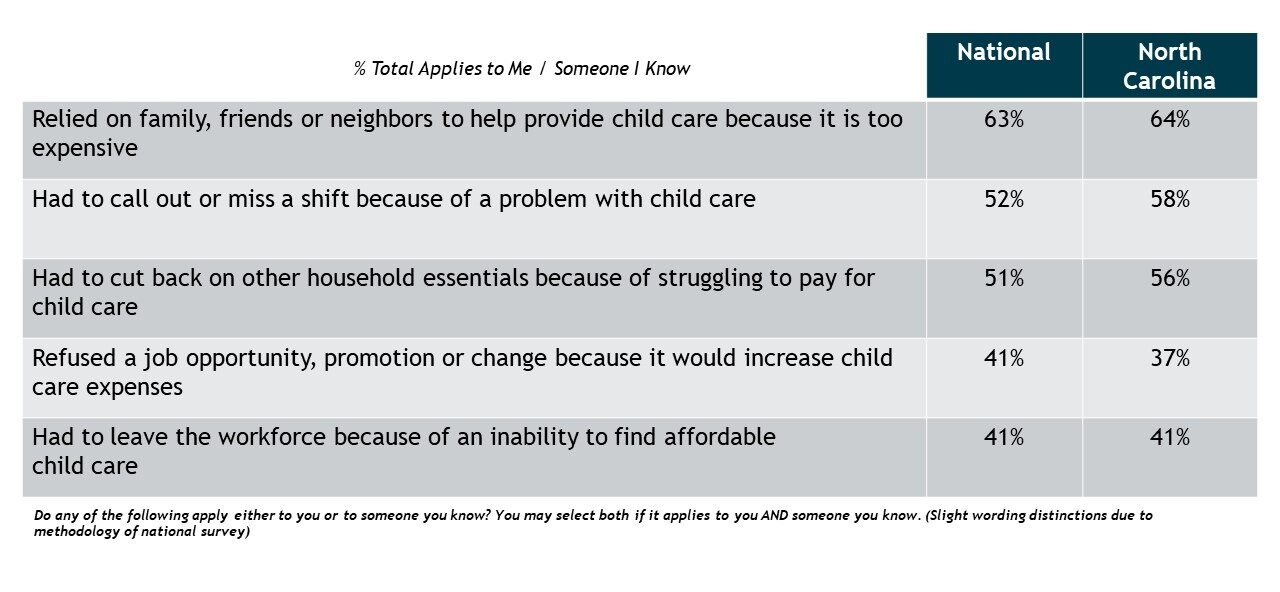Solving to Stay Competitive: North Carolina’s Child Care Crisis

As the NC Chamber’s long-term planning and research center, the NC Chamber Foundation addresses the most critical and difficult challenges and opportunities ahead for North Carolina. Our data-driven agenda ensures North Carolina continues to stay ahead of critical issues and achieves measurable improvement across all areas of national and global competitiveness.
One of the most essential factors for North Carolina’s economic success is attracting and retaining talent. A key component of that is access to quality, affordable child care for our workforce. Last month, the NC Chamber Foundation released findings of its statewide survey conducted among North Carolinian voters to understand their child care experiences, the impact it is having on their ability to work, and their understanding and support for child care.
With federal child care stabilization funding ending this year, the crisis is likely to worsen for both our state and the nation. Increased awareness of this issue is critical as we look at our state’s future. North Carolina will have a unique competitive advantage if we can come together as business and community leaders, policymakers, and North Carolinians to find solutions to this challenge.
This month’s Foundation Forecast features guest insights from Lori Weigel, Principal of New Bridge Strategies, the research firm that conducted the statewide survey for us. Lori provides insight and data on how the child care crisis facing our state compares to that on a national level.
Meredith Archie
President
NC Chamber Foundation
Solving to Stay Competitive: North Carolina’s Child Care Crisis
One of the most enduring features of work life since the onset of the pandemic has been the rise in Zoom or other video platforms, which quickly supplanted the phone conference call. Not only did the advent of these video calls necessitate a whole new etiquette regime (camera on or off?), but it suddenly allowed co-workers a window into everyone’s home. In fact, seeing co-workers juggling a child/children while balancing work tasks – or hearing about the struggle for those in a workplace – appears to have left a big impression on North Carolinians’ perceptions of child care.
In a recent statewide survey of 500 voters throughout North Carolina, over three-quarters rate lack of quality affordable child care programs as a “serious problem” – just behind crime and the cost of housing as problems facing the state. In fact, a plurality of 45 percent says that the availability of quality and affordable child care has gotten worse since 2020 and the start of the pandemic, with two-thirds (66 percent) of parents of young children saying the availability of child care has deteriorated.
North Carolinians are not alone in struggling with the child care system. My firm asked voters nationally late last year and here in North Carolina in April about challenges people might have experienced in relation to child care. Voters were asked to indicate whether that applied to them personally and/or to someone they know. The data clearly shows how pervasive these challenges are and how broadly recognized they are today, as evidenced in the following graph.

Predictably, parents of young children are most likely to say child care challenges have impacted them personally, with a stunning one-in-four (26 percent) saying they had to leave the workforce because of an inability to find affordable child care. In a question only asked in North Carolina, nearly one-in-three parents of young children in the state say they did not pursue job training or continuing education due to a lack of affordable child care. That’s thousands of parents with a career trajectory that suddenly went off course, and nearly as many employers grappling with those repercussions.
This is likely one reason the vast majority of North Carolinians assert that child care is necessary to strengthening the economy. As seen in the following graph, North Carolina voters are even more likely to connect the dots between child care and economic repercussions as all Americans.

With wide recognition that many families are struggling and that the child care shortage is having an impact on the state’s economy, it is no wonder that North Carolina voters want to see something done. Fully 87 percent believe that acting on this issue “should be an important priority for North Carolina this year.” Similarly, more than four-in-five (81 percent) say that “The lack of child care in North Carolina is a problem that will not solve itself. North Carolina should invest in solutions.” More specifically, voters are willing to spend state funds to address this issue. Fully 79 percent support increasing state funding to provide more working families with access to affordable, quality child care.